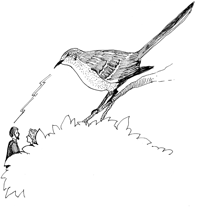STRANGEBUTTRUE- Mock, yeah: Beware, the bird remembers malefactors

DRAWING BY DEBORAH DERR McCLINTOCK
Q. Don't mock the mockingbirds, or else. Or else what?–B.Bird
A. These birds can learn to recognize you, and they hold a grudge, says Michael Abrams in Discover magazine. When biologist Doug Levey had an accomplice "intruder" disturb nests of mockingbirds, standing by an egg-filled nest for 15 seconds and then touching it, the birds learned to pick out this threatening individual from a crowd. When other nonthreatening humans approached, they were ignored, but every time the intruder came by, the birds left the nest to dive bomb the malefactor.
"The first time a male mockingbird drew blood on the back of my neck, I was shocked," said intruder Monique Hiersoux. Mockingbirds are strongly aware of humans, adds Levey.
"We might be walking along on campus and see a mockingbird perched on a branch and think, 'Oh, that bird is minding its own business.' But what we don't realize is that we are its business."
Q. If animals ate at restaurants, would they choose the no-smoking section? –P. Morris
A. Effects of second-hand tobacco smoke have been thoroughly tested over the years, including its impact on many different animal species, reports University of California psychopharmacologist Ronald K. Siegel.
* When colonies of luminous marine bacteria are subjected to infused smoke, they turn off their lights.
* Not only do bees, flies, and other insects quickly perish before the smoke, but so do leeches feeding on the blood of human tobacco smokers.
* When placed in enclosed smoky chambers, frogs, pigeons, mice, rats, guinea pigs, rabbits, and dogs died slowly over a couple of weeks or months.
* When beagles were fitted with masks that forced them to inhale intermittent smoke over a period of time, hundreds of them expired.
Q. That $20 bill you just found makes this your lucky day, but you'd like it to be a happy day as well. A good bet here would be to a) treat yourself to a few beers; b) pay down some of your credit card debt; c) rent a video comedy; d) buy a friend a gift; e) give part of the money away.—M. Teresa
A. Take a tip from the Dalai Lama: "If you want others to be happy, practice compassion. If you want to be happy, practice compassion." So choose d) and e) above, say Elliot Aronson Social Psychology. Research by E. Dunn, L. Aknin and M. Norton found that people who spent money on others were happier than self-spenders.
"So next time you have a little extra money, rather than buying yourself a treat, try treating a friend to lunch or donating to charity," they write. "You might be surprised how good you feel."
But such prosocial acts don't necessarily come easily to people. Some cultures are known to value simpatia, or friendly helpfulness, prominent in Spanish-speaking , but with no direct English translation.
Researchers sampled 23 cities around the world, noting if people would assist someone who had dropped a pen, or who wore a leg brace, or who was blind. The rates varied widely, with countries that prize simpatia helping on average 83%, compared to 66% elsewhere. Other factors may also play into pro-sociality, so these numbers are only suggestive.
~
Send Strange questions to brothers Bill and Rich at [email protected]
#